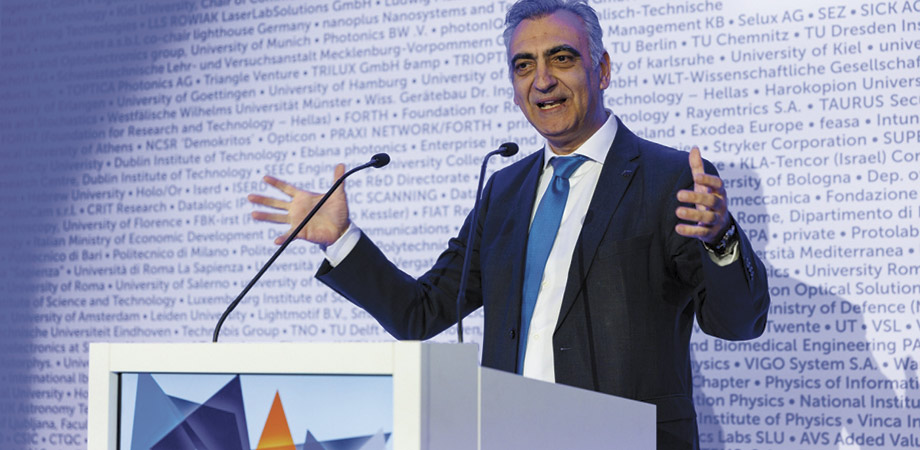European photonics lays down the gauntlet: Industry leaders beseech policymakers to help them maintain global ranking

Photonics21 President Lutz Aschke has laid down the gauntlet: “The European photonics industry is number two in the world. To make sure we maintain and defend this position, national and European policy makers need to prioritize this strategic sector.”
He gave those remarks in late Spring, as key players from Europe’s photonics industry gathered in Brussels, Belgium, for the two-day Photonics Partnership Annual Meeting, organized by Photonics21. The European platform embraces most of the continent’s leading photonics companies and industries, research groups, and other stakeholders along the whole economic value chain.
As of mid-2023, Photonics21 numbers more than 3,800 members. Of these, more than 1,000 members from 30 countries registered to attend the presentations and participate in workshops in Brussels.

Lutz Aschke. Photo credit: Matthew Peach
Aschke, whose day job is CFO of metrology company Mahr Group, opened the meeting with a ceremonial handing over of the new Photonics21 Strategic Research and Innovation Agenda (SRIA) 2023-2030 to the European Commission’s (EC) Thomas Skordas.
Skordas, of the EC’s Directorate-General for Communications Networks, Content and Technology, gave a keynote speech on the importance of photonics in the EU’s research and policy initiatives. He told the meeting, “photonics is now playing a key role in a fast-evolving world,” and he encouraged all participants to influence European photonics toward further growth and greater autonomy.
Gabriel Crean, CEO at Lux Consulting Group, joined the party, stressing the “importance of photonics for Europe´s autonomy in key strategic value chains. In the face of strong headwinds, there is a need for more partnerships, more public and private support, and less restrictions to foster strategic autonomy,” Crean said.
After the introductory talks, Photonics21 attendees decamped to breakout sessions in the meeting rooms of the Brussels’ Radisson Collection Hotel. The delegates took the opportunity to network and discuss the latest developments, challenges, and market opportunities, but there were also tasks to complete. All took part in work groups designed to discuss and develop research and innovation priorities for the next Photonics Partnership, Horizon Europe, which is the bureaucratic linkage between SRIA and the EC.
These “bottom up” sub-meetings are focused on key branches of photonics structured to help set the agenda for photonics sector research priorities across the continent, and indirectly which projects get access to partial funding by the EC.
The topics include digital infrastructure, manufacturing, health, climate, mobility, and energy; safety, security, space, and defense; agriculture; and “core.” The role of Core Photonics is to ensure that fundamental technological developments are ready to underpin the other application-specific developments and provide solutions to Europe’s socio-economic challenges, as they emerge.
Describing the brand-new SRIA, which can be downloaded from www.photonics21.org, Aschke said it “represents a significant milestone for the photonics industry in Europe, outlining a vision and pathway forward for the European photonics community. With its renewed strategy, Photonics21 is responding to the EU’s need to re-establish economic competitiveness by way of strategic autonomy and resilient, strategic supply chains.”
He added, “The two overriding priorities of the EU for economic competitiveness are to achieve strategic autonomy in key sectors of the European economy, to continue strengthening EU strategic supply chains, and to reduce trade dependencies. The European photonics community has both the capacity and capability, along with the motivation, to contribute to these two interlinked challenges.”
Aschke’s observations about the ability of SRIA to meet these ongoing challenges were not based on ideals or some contrived problems to encourage action. The ideas of technological sovereignty and existential threats to Europe’s supply chains had been heavily discussed at the 2022 meeting. And the ongoing concerns of the wider European photonics industry were borne out in a Photonics21 survey report released during this year’s meeting.
The survey report, jointly produced by Photonics21 and the European Photonics Industry Consortium (EPIC), reveals that in order to deal with serious supply chain problems, the “overwhelming majority of European photonics companies are calling for the intervention of policymakers.”
The report, also available on the Photonics21 website, states, “The European photonics industry is facing serious supply chain issues that are the direct result of an overdependence on overseas markets.”
The survey found that more than 80 percent of EU-based photonics companies are grappling with supply chain shortages. By their own admission, most of them will not be able to solve these supply chain issues by themselves and call upon national and European policymakers for help.
It adds, “The vulnerability of the European photonics supply chain may lead to serious knock-on impacts on all these key European industrial sectors. Policies such as the European Chips Act and the Critical Raw Materials Act show that the European Union aims at more strategic autonomy in existing and future emerging economic sectors.”
One month after the meeting, Photonics21 announced a workshop series to focus the research and investment priorities for the Horizon Europe work program 2025. Interested parties are invited to “have your say in the process of identifying the areas of future funding and register to the workshops.”
Matthew Peach is Editor-in-Chief of optics.org
| Enjoy this article? Get similar news in your inbox |
|



